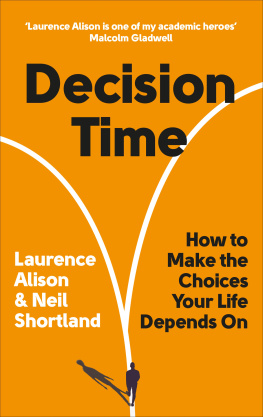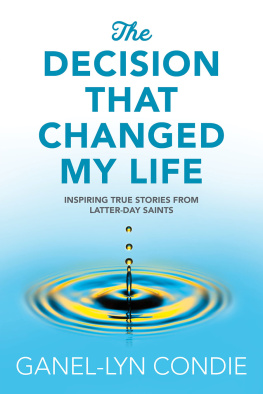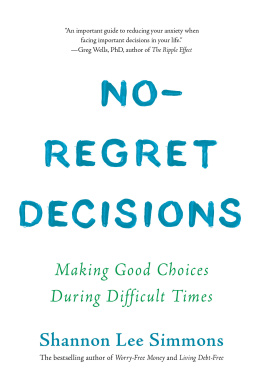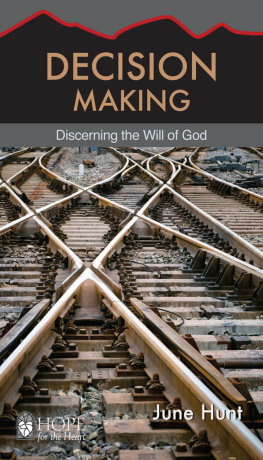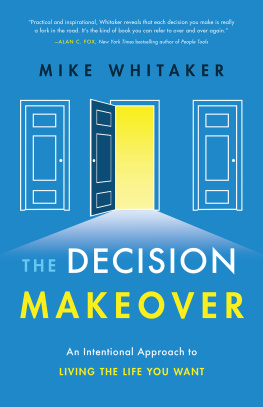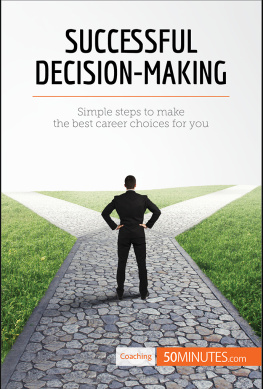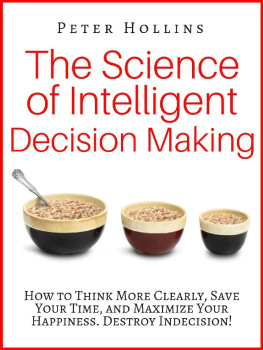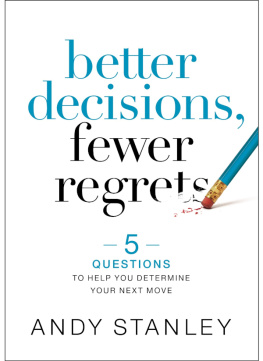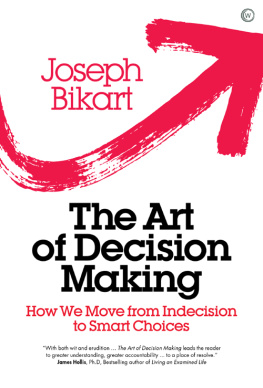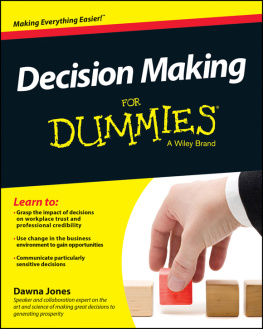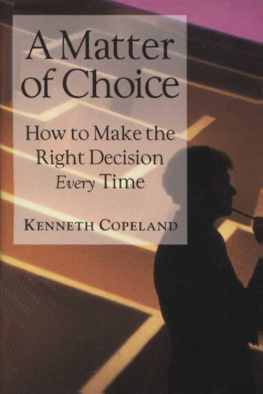
Laurence Alison and Neil Shortland
DECISION TIME
How to Make the Choices Your Life Depends On

Contents
About the Authors
Professor Laurence Alison is the Director of Ground Truth (www.ground-truth.co.uk), a research and training consultancy for military and law enforcement leaders, offering cutting-edge advice and tuition on how to make tough decisions in crisis situations.
He is the author of more than 200 publications including 10 books on critical incidents, offender profiling and interrogation, and his work has influenced high-risk decision-making and interrogation around the world. In 2021 he was awarded an MBE in the Queens New Years Honours list for his services to these areas.
Neil Shortland, who has a PhD in military decision-making, has worked with the UK Ministry of Defence studying military training and operations in Afghanistan, and established a multi-million-dollar research centre at the University of Massachusetts, Lowell (USA) on security and counter-terrorism.
Together Neil and Laurence have studied how people in extreme situations take high-risk decisions. Their work has taken them all over the world. Their theories of decision-making specifically, how to overcome overthinking and decision inertia have been published in academic journals and their critically acclaimed book Conflict: How Soldiers Make Impossible Decisions was published by Oxford University Press in 2019.
Laurence: To my son, Heath 6 foot 4 inches, with size 13 feet an unusually good problem-solver and lateral thinker (though he has the humility to never brag about it). I wish I had your patience with others and your inner calm (especially under pressure). Parents never say you cant learn from your kids.
To the doctors and nurses at Alder Hey Childrens Hospital who saved Heaths life when he was a breath away from being taken from us at nine months.
Neil: To Josephine Yuen and the $1 beer that changed my life.
INTRODUCTION
From War Zones to Wedding Planning
Time was against me, and I had to make a choice. Should I go down this street and risk being shot or should I keep on going and risk being blown up by an improvised explosive device?
I simply dont know what to do for the best. I want to have a big wedding with all our friends, but I also just want to be married, and all this fuss is getting me down.
T HIS FIRST OF these quotes came from a member of the United States Armed Forces: we were asking him about the hardest decision he faced during a deployment in Afghanistan. He told us hed had to choose between taking an unfamiliar route through a very violent part of town or doubling back down the route he had just taken a move that is advised against as insurgents sometimes plant bombs on routes they have seen soldiers on. The second quote comes from a friend who was deciding between having his wedding in the next 12 months so he and his wife could start their married life together, have kids and buy a house or delaying the wedding by 12 months so that more people could make the long and expensive trip to Australia, where they were now living.
On the face of it, these decisions seem worlds apart and in many respects they are. The first was thrust on a soldier in the heat of Afghanistan, in the midst of a (then) 18-year-long war. The second was faced by a couple sitting in a comfy three-bedroom flat in metropolitan Sydney.
Yet look at these decisions from a psychological standpoint and you find several distinct similarities. Firstly, neither decision maker had faced a decision like this before. Our soldier called the choice before him unique and not one I had trained for, while our friend had never had to juggle wedding planning, let alone a wedding that involved hundreds of people flying across the globe. Furthermore, in both decisions, all options presented the decision maker with a chance of a good outcome and, equally, a chance of a bad outcome. For our soldier, either decision could have resulted in significant physical harm or the safe return to base. For our friend, either decision could have a negative outcome delay the wedding, but you might find people still cannot travel, or get married now but forever regret that so many friends and family members hadnt been there to see you tie the knot. Equally, either choice could lead to a positive outcome what is a 12-month delay if it means you get to have your dream wedding? Or maybe you have the wedding now, and even with the smaller guest list you have the day of your dreams with your nearest and dearest. And finally, in both situations the only way to know the outcome was to make the decision.
We have spent our professional careers helping soldiers, police officers, medical professionals and others in high-stakes environments make tough decisions when lives are on the line. Laurences work on operational debriefing has seen him working on cases as diverse as planning for the London and Beijing Olympics; the response to the 7/7 London bombings in 2005; the way Europes biggest ever non-wartime fire (at Buncefield in the UK in 2005) was handled; the disaster victim identification teams response to the Boxing Day tsunami in Indonesia in 2004; and the poisoning of Russian dissident Alexander Litvinenko in London in 2006, as well as countless other major homicide and serial rape investigations. Neils first job was working at the United Kingdoms top science laboratory (Porton Down) where he helped soldiers prepare for their deployments to Afghanistan. Since then, he has worked with soldiers, police officers and senior decision makers across the world as they face a range of challenges in their roles.
Interestingly, the feedback weve often had from military, security and other leaders weve worked with is that while our training has been directed at their professional decision-making, our courses have also helped them make better choices in their personal lives.
And thats what led us to write this book because weve realised that what we know helps people make the big decisions in their personal lives, as well as the urgent, life-or-death decisions in tense, wartime or security situations. In the chapters that follow were going to take you through the building blocks of good decision-making: and that means the next time youre faced with a major choice that will determine your future, youll be confident about how to tackle it.
Because one thing we truly know is this: all of us will find ourselves, at various points in our lives, at an important crossroads, where we must make a significant and potentially life-changing decision. It might be whether to move house, if we should leave our job or partner, whether to move to a new country, how we might help our elderly parents or children, whether to report an incident at work or if its right to euthanise a pet.
We are also aware, both as scientists and as observers of the world, that the tendency for indecision is often the most damaging outcome. We see inertia all around us, and we believe its the most potentially harmful element of decision-making. From people failing to leave unhappy relationships, to dithering over whether to change careers, to avoiding making lifestyle changes that would make for better health, decisions are not simply about what is decided, but also when and inertia serves us poorly. In many of our most crucial moments, it is an inability to overcome the fear of action that causes the most damage and stops us from being our happiest, healthiest, most successful selves.
Next page
